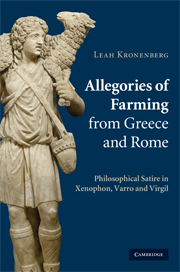Epilogue
Published online by Cambridge University Press: 03 May 2010
Summary
I have designed my readings of Xenophon's, Varro's, and Virgil's agricultural dialogues to work independently of each other, though I hope to have shown ways in which they may also have been in dialogue with each other and with the genre of philosophical or Menippean satire. Viewing the Georgics as an outgrowth of philosophical dialogue, and not just of various genres of poetry, presents new ways of thinking about the poem's polyphony, as well as its allegorical and ironic aspects. Allowing Varro's dialogue the importance of a philosophical satire forces the reader to come up with explanations for the many contradictory and surprising aspects of the text that are too easily swept beneath the rug of Varro's old age, professed haste, and pedantic tendencies. Finally, granting Xenophon's Oeconomicus the status of a true Socratic dialogue integrates it with Plato's more famous renditions of his master's conversations and with a tradition of dialectical philosophy that requires careful reading and a literary sensibility to decipher. When each work is read in such a manner, a remarkably similar allegorical use of farmers, herds, and beehives emerges, one that questioned the foundations of politics and morality long before Mandeville scandalized Europe with his greedy bees.
- Type
- Chapter
- Information
- Allegories of Farming from Greece and RomePhilosophical Satire in Xenophon, Varro, and Virgil, pp. 185Publisher: Cambridge University PressPrint publication year: 2009



